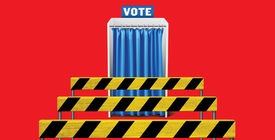You’re reading The Briefing, Michael Waldman’s weekly newsletter. Receive it in your inbox.
Update: On April 10, the House passed the SAVE Act. The Senate has not yet voted on the bill.
The House of Representatives chamber has been the site of some of history’s greatest strides for the freedom to vote. It’s where Lyndon Johnson called for the Voting Rights Act. Where lawmakers voted to end the poll tax and advance constitutional amendments to grant the vote to women and 18-year-olds.
As I write, the House is currently barreling toward something very different: a bill to restrict the vote — to prevent millions of American citizens from casting ballots. If it becomes law it would be the most significant voter suppression bill ever passed by Congress.
The bill is called the SAVE Act. It would essentially require Americans to produce a passport or a birth certificate to register and vote. Brennan Center research shows that at least 21 million voters lack ready access to those papers.
About half of all Americans don’t have a passport, for example. (Wait, how do they summer in France?) As for a birth certificate, many people may have one . . . but they don’t know where it is. (In a shoebox? At my mom’s house?)
It’s worse than that. Tens of millions of married women have changed their last names, so the names on their birth certificates don’t match their current legal names. One estimate is that 8 in 10 women in opposite-sex marriages took their husband’s last name.
The bill has drawn the ire of election officials from both parties, because it would upend the way we register voters in all 50 states. Registration online or by mail? Not anymore. Voter registration drives would be functionally eliminated. Automatic registration at the DMV would be much harder.
In short, this would be the worst voting bill ever passed by Congress.
It echoes an executive order President Trump issued last week that purported to take over the election system in the United States by presidential edict. That executive order has little legal force — it’s flatly illegal in most of its particulars.
This morning, the Brennan Center sued to block it, together with the American Civil Liberties Union, ACLU-DC, Legal Defense Fund, LatinoJustice PRLDEF, and Asian Americans Advancing Justice – AAJC, on behalf of the League of Women Voters and other groups.
Nowhere in U.S. law does it say that the president has the power to change the rules of elections. The Constitution empowers Congress and the states to make the rules. Congress has delegated some of its authority to the Election Assistance Commission (EAC) — crucially, created as an independent bipartisan entity, precisely to prevent meddling of this kind.
Trump’s executive order would essentially limit voter registration to only those who have a passport — it seems even a birth certificate may not be enough. It would also decertify almost all the voting machines used in the United States. Again, none of this has legal force, though, because the president lacks the power to order the independent EAC to do his bidding.
And, oh yes, the order would have states grant Elon Musk’s DOGE team access to the voter rolls. It would expose massive volumes of private information to Musk’s team without adequate safeguards. Expect DOGE staff to grandly announce findings of fraud, only proving that they do not actually understand much of what they are reviewing, just as they have with their error-ridden audits of government spending.
This is a mess: destructive, ill-considered, unnecessary. (Ask me how I really feel.) In congressional debate, we’ll hear claims that the SAVE Act is needed for election integrity. That’s nonsense. States have many systems in place to ensure that only citizens vote. Claims of massive fraud are a myth, nothing more.
We’ll also hear people say this is just a “voter ID” bill. More nonsense. Under the terms of this bill, producing an ordinary driver’s license wouldn’t be enough to register to vote. Just a document like a passport or birth certificate.
No, the reason Congress is even considering this misguided voter suppression bill is because Donald Trump demands it. It reflects his continued claim that the 2020 election was stolen. It taps unwarranted fears without doing anything to actually improve election security.
Lawmakers should stand firm. Senators should know: This bill is headed your way. Enough senators could easily kill it by refusing to allow it to come up for a vote. They should be ready to do so.
In 1965, Congress passed voting rights legislation after seeing footage of John Lewis being beaten in Selma, Alabama. Lawmakers responded with a commitment to justice. This time, Congress would act in service to a conspiracy theory. Tens of millions of American citizens would pay the price.






